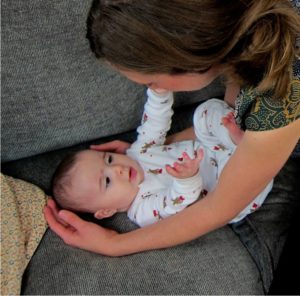Is this the age of guilty parents? Have mothers always felt this guilty? I don’t think guilt was part of my mother’s generation of parenting—even though she felt plenty guilty…but we won’t go there.
Revolution requires a pendulum swing. We know so much more in the past two decades about brain development and children’s needs that our current revolution is fighting hard to banish traditional parenting modes of fear, pain and suffering to get desired behavior.

It is the extreme ends of the continuum that are needed to push our buttons into action. Let’s hope we can learn what we need to as a parenting culture from these polarities and not get mired in blame, shame, and guilt.
The singular idea of a mother breastfeeding her 3 year old doesn’t provoke much emotion anymore. It’s the captured attitude of this casual, hot, hand-on-hip mother breastfeeding a child who looks eight that throws the pendulum and raises all kinds of issues and ideologies (evidenced by the comments on my facebook page).
Inevitably when revolutionary ideas grab for attention, a lot of guilt can result, especially in the arena of parenting. The feminist revolution made us damned if we worked and damned if we didn’t. Many women still feel damned but that swing is beginning to settle.
Now breastfeeding is the gold standard and attachment parenting is the “Oregon Trail”. Time’s cover heightens the guilt of not only the mother who doesn’t breastfeed, but the one who doesn’t for long enough. The question used to be, Are you a “good enough” mother? Now the anty has been upped to, “Are you mom enough?” In other words, can you take it? Can you go all out to prove what a perfect mother you are, no matter what is going on in your life? Taking the question to the extreme—Can you breastfeed for 3 years confined to a wheelchair, working three shifts, as a single mom with four other kids?
Kate Pickert, author of the Time article, hits the nail on the head when she speaks for mothers caught in the middle. “These parents try to achieve [Dr. Bill, father of attachment parenting] Sears’ ideal of nursing, baby wearing, and co-sleeping but fall short for some reason and find themselves immobilized by their seeming parental inadequacy.”
When the dust settles, let’s not settle for feeling inadequate. Connective Parenting focuses on how a parent and child interact, not what they do in order to interact. A mother is equally capable of full connection with her baby (and toddler) when she is bottle-feeding, when she puts her baby down so she can do something, when she allows her baby to reach and crawl for what he wants, when she knows his sleep rhythms so well she can put him in a crib by himself to fall asleep on his own without a tear, even when she can allow him a moment or two of frustration. Connection does not dictate the rules of the game. Connection allows you to play the game however you want as long as all the players enjoy themselves. Sometimes enjoying a game involves anger, frustration, and disappointment but the goal is to come out of it with fair play.
Attachment parenting raises the issue of connection. It does not intend to create guilt. So let’s think of it as a way, not the way. Love and acceptance do not have to pass through skin contact. Eye contact, smiles and laughter, understanding each others’ cues, mimicking sounds and actions, firing those mirror neurons—that is the stuff of connection.
Hopefully when this current revolution wanes, we will have left the punishments and power plays of the old system well behind and can settle for good old relationship building, even if breastfeeding can’t be a part of it.







